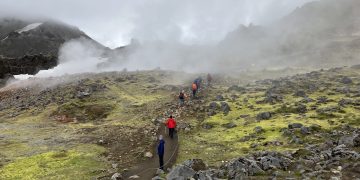In today’s hyper-connected world, digital fatigue has become a widespread issue. It’s that feeling of being overwhelmed, mentally exhausted, and even a little numb from the constant barrage of notifications, screens, and online demands. Whether it’s from social media, work emails, or endless news feeds, our digital lives can take a toll on our physical and mental well-being. As a result, many people are seeking ways to disconnect and restore balance. One such way is through long trail hikes—a form of immersion in nature that has the potential to heal the mind and body from the effects of prolonged digital engagement.
But the question remains: can long trail hikes truly cure digital detox fatigue? Let’s explore this topic by looking at the psychological, physiological, and social benefits of long hiking trips, and how these benefits directly counter the symptoms of digital overload.
Understanding Digital Detox Fatigue
Before diving into how hiking may serve as a remedy, it’s important to understand what digital detox fatigue is and how it manifests. In simple terms, digital detox fatigue refers to the mental, emotional, and physical exhaustion caused by prolonged exposure to digital devices. This condition can affect anyone who spends a significant amount of time on screens, including smartphones, computers, and televisions. Symptoms include:
- Mental Exhaustion: Constantly processing information from multiple sources, multitasking, and engaging in shallow interactions can drain cognitive energy.
- Emotional Overload: Digital environments often trigger emotional responses—whether it’s the anxiety induced by social media comparisons, the stress from work-related emails, or the frustration from dealing with endless notifications.
- Physical Discomfort: Staring at screens for hours on end can cause eye strain, headaches, neck and back pain, and poor posture. This physical discomfort can lead to chronic fatigue.
- Disconnection from Nature: The more we immerse ourselves in digital spaces, the more we disconnect from the natural world. Nature, as studies suggest, has a calming effect on the mind and can help alleviate stress.
In essence, digital detox fatigue is a form of burnout, but specifically tied to the overstimulation of technology. The solution? A true detox—a break from the digital world, and the return to something more grounded, more real.
The Healing Power of Nature
Nature has long been touted as a restorative environment for the human body and mind. The healing benefits of nature are well-documented, from reducing stress levels to improving cognitive function. Studies have shown that spending time in natural settings can significantly reduce the physiological markers of stress, such as heart rate and blood pressure, while improving mood and overall well-being. This makes long trail hikes an excellent tool for combating the mental fatigue that comes from excessive screen time.
The Psychological Benefits of Long Trail Hikes

Long trail hikes provide a perfect escape from the digital chaos. The sustained exposure to natural landscapes—whether through mountain passes, dense forests, or coastal paths—can have profound psychological benefits. Here’s how:
- Reduction of Mental Fatigue: Hiking offers a respite from the mental clutter created by technology. With every step, your brain enters a more relaxed state, focused not on digital notifications but on the beauty of your surroundings. The act of hiking itself—taking slow, deliberate steps, breathing in fresh air—creates a meditative rhythm that calms the mind.
- Enhanced Mindfulness: Hiking demands a certain level of mindfulness. Unlike sitting in front of a computer screen, where your mind can easily wander, hiking forces you to be present in the moment. This presence helps you engage all your senses—sight, smell, hearing, and touch—which can rewire the brain, improving concentration and reducing mental fatigue. The beauty of nature pulls you away from intrusive thoughts, allowing you to experience the world in a more vivid, grounded way.
- Boosted Mood and Reduced Anxiety: Physical activity in natural settings has been shown to reduce anxiety and depression. Hiking releases endorphins, the body’s natural mood enhancers, which combat feelings of stress and anxiety. Moreover, nature has a unique ability to shift your perspective, reducing feelings of overwhelm and restoring a sense of calm.
- Improved Cognitive Function: Extended exposure to nature is known to improve cognitive functions such as memory, attention, and problem-solving. When you hike, you engage both your body and mind in the task at hand—navigating the trail, solving the problem of the next waypoint, and remembering landmarks. This gives your brain a workout in a way that a digital environment never can.
The Physical Benefits of Hiking
While the psychological benefits of hiking are well-known, the physical advantages are just as significant. Hiking is a full-body workout that strengthens muscles, improves cardiovascular health, and enhances overall physical stamina. For those suffering from digital fatigue, this can be particularly important.
- Restoring Physical Energy: Prolonged sitting, especially in front of screens, leads to poor circulation, muscle tightness, and physical lethargy. Hiking, on the other hand, encourages the body to move, releasing tension and improving blood flow. The more you walk, the more oxygen your body receives, which helps boost energy levels.
- Improved Posture: Digital device use encourages poor posture, often leading to “tech neck” and back pain. Hiking, particularly in challenging terrains, helps promote better posture by engaging your core muscles and encouraging more natural movement.
- Better Sleep: The physical exertion from a long hike can help reset your body’s internal clock, promoting deeper and more restorative sleep. Hiking also exposes you to natural light, which helps regulate circadian rhythms, further contributing to better sleep quality.

The Social Benefits of Hiking
One of the often-overlooked aspects of hiking is its social dimension. Although hiking can be done solo, it is also an activity that can be shared with others. In a world where digital connections often feel superficial and fleeting, hiking provides the opportunity for more meaningful, face-to-face interactions. Sharing a trail with friends, family, or even strangers creates a sense of community and belonging that digital interactions simply can’t replicate.
- Strengthening Relationships: Spending hours on a trail with someone allows for uninterrupted, quality time together. The shared experience of hiking—whether tackling a challenging climb or simply enjoying a scenic viewpoint—builds stronger bonds and fosters deep conversations.
- Building New Connections: Long trails often bring together a diverse group of hikers from various walks of life. These connections can be enriching, offering the chance to meet people with shared interests or different perspectives, and providing a refreshing alternative to online interactions.
- Creating Lasting Memories: While digital interactions are often fleeting, the memories you create on a long hike are tangible and lasting. Whether it’s a stunning sunrise over the mountains or the feeling of accomplishment after reaching the summit, these experiences become part of your personal story.
Why Long Trails?
While any form of outdoor activity can help alleviate digital fatigue, long trail hikes offer a unique combination of benefits. Here’s why long trails are especially effective:
- Extended Immersion in Nature: Unlike a quick weekend getaway or day hike, long trails—such as the Appalachian Trail or Pacific Crest Trail—offer prolonged immersion in natural environments. This extended time in nature allows for a deeper connection with the surroundings and a more complete mental and physical reset.
- Challenging the Mind and Body: Long hikes often involve diverse terrains and challenges, requiring mental fortitude and physical resilience. This combination of challenge and achievement can lead to a greater sense of accomplishment and well-being.
- A Break from Everyday Distractions: On a long trail hike, you are often far from civilization, which means fewer distractions—no emails, no calls, no social media. This gives your mind a much-needed break from the constant noise of the digital world, allowing you to reconnect with yourself and the natural world.
- Personal Reflection: Long hikes provide the perfect space for self-reflection. The solitude and time away from screens offer an opportunity to disconnect from the external world and reconnect with your inner thoughts. This mental space allows for creativity, problem-solving, and personal growth.
Conclusion: Is Hiking the Ultimate Cure?
So, can long trail hikes cure digital detox fatigue? In short, yes. Hiking offers a comprehensive remedy to the symptoms of digital overload, from reducing mental and physical fatigue to improving mood and strengthening relationships. The unique combination of physical exertion, immersion in nature, and the opportunity for personal reflection makes hiking one of the most effective ways to combat digital burnout.
In a world that demands constant attention from our devices, long trail hikes provide the perfect antidote—a chance to disconnect, recharge, and rediscover the power of nature.























